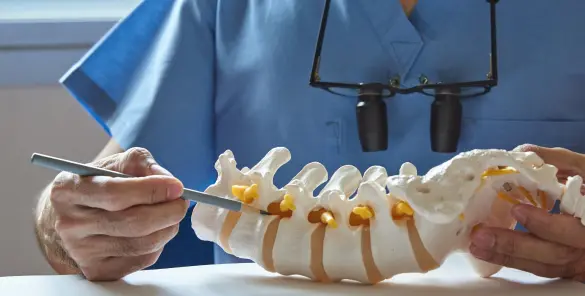Minimally invasive spine surgery (MISS) is an alternative procedure to traditional open surgical procedures performed to treat various spinal disorders, like :
1.degenerative disc disease
2.herniated disc
3.scoliosis
4.spinal stenosis.
Spine surgery performed minimally invasively offers many potential benefits, such as small incisions, less cutting through soft tissues (eg, ligaments, muscles), outpatient options, less post-operative pain, low infection changes, lesser blood loss and faster recovery.
Surgeons at Saroj Hospitals, have been performing minimally invasive spine surgeries and perform varied cases with different criticalities. To have a clarified perception for your surgery look up to the Best Neurologist/ Neuro Surgeon in Delhi.
Common Spine Surgery Goals
Whether use minimally invasive technique or traditional open surgical technique, spine surgery has 2 fixed common goals.
1.Decompression : Spinal decompression involves removing tissue that is compressing nerve structures, such as a spinal nerve root and/or the spinal cord.
2.Stabilization : Abnormal movement of one or more levels or segments of the spine can cause back or neck pain. Surgical procedures that stabilize and stop movement of the spine involve spinal instrumentation and fusion.
Minimally Invasive Spine Surgery Techniques
Types of surgical procedures performed minimally invasively include
1.Discectomy or Microdiscectomy,
2.Foraminotomy or Microforaminotomy,
3.Microlaminectomy
4.Microlaminotomy
Surgical imaging systems and image-guidance technologies, such as fluoroscopy (real time x-ray), are utilized during surgery to mark the key aspects of the patient’s spinal anatomy. Furthermore, surgical imaging projects 2D and 3D views and guides placement of instrumentation, such as pedicle screws. Get all the facilities for your spine surgery or disorder treatment and get every query cleared at the, Centre for Spine & Neuro Sciences in Delhi.
Spinal Disorders Which Can be treated with MISS
1.Degenerative Disc Disease : This usually develops gradually in older adults affecting the spine’s intervertebral discs. Normal cellular age-related changes in the body can cause discs to stiffen, lose flexibility, strength, height and shape, and ability to absorb and distribute forces associated with movement. These structural changes can also bring in a risk for disc herniation.
2.Herniated Discs : A herniated disc, sometimes called a slipped disc or ruptured disc, occurs when the gel-like inner core of an intervertebral disc wears through the protective outer layer of the disc. Besides the damaged disc, the interior gel can irritate and inflame nearby spinal nerves and cause back pain.
3.Scoliosis : Scoliosis is an abnormal sideward curve of the spine that may cause progressive spinal deformity. A scoliotic curve may look like an “S” or “C.” Most cases of scoliosis have no known cause—and while the condition is mostly associated with children, adults can develop scoliosis as well.
4.Spinal Stenosis : Spinal stenosis occurs when spinal nerve roots and/or the spinal cord get compressed. The nerve roots branch off the spinal cord and exit the spinal canal through passageways called neuroforamen. Nerve and/or spinal cord compression can cause symptoms such as pain, weakness, tingling sensations, and numbness.
Risks Involved:
Any type of spine surgery brings with it, potential benefits and risks. Listed below are several possible complications that may occur during and/or after spine surgery irrespective of both open and minimally invasive spine surgical procedures.
1.Bleeding
2.Blood clots
3.Nerve damage
4.Return of symptoms
5.Failed fusion (known as pseudarthrosis or non-union)
6.Infection
To know the correct situation of your spine problems, and understand if you are a candidate for the minimally invasive spine surgery, approach Saroj Hospital, Best hospital for spine surgery in India.



